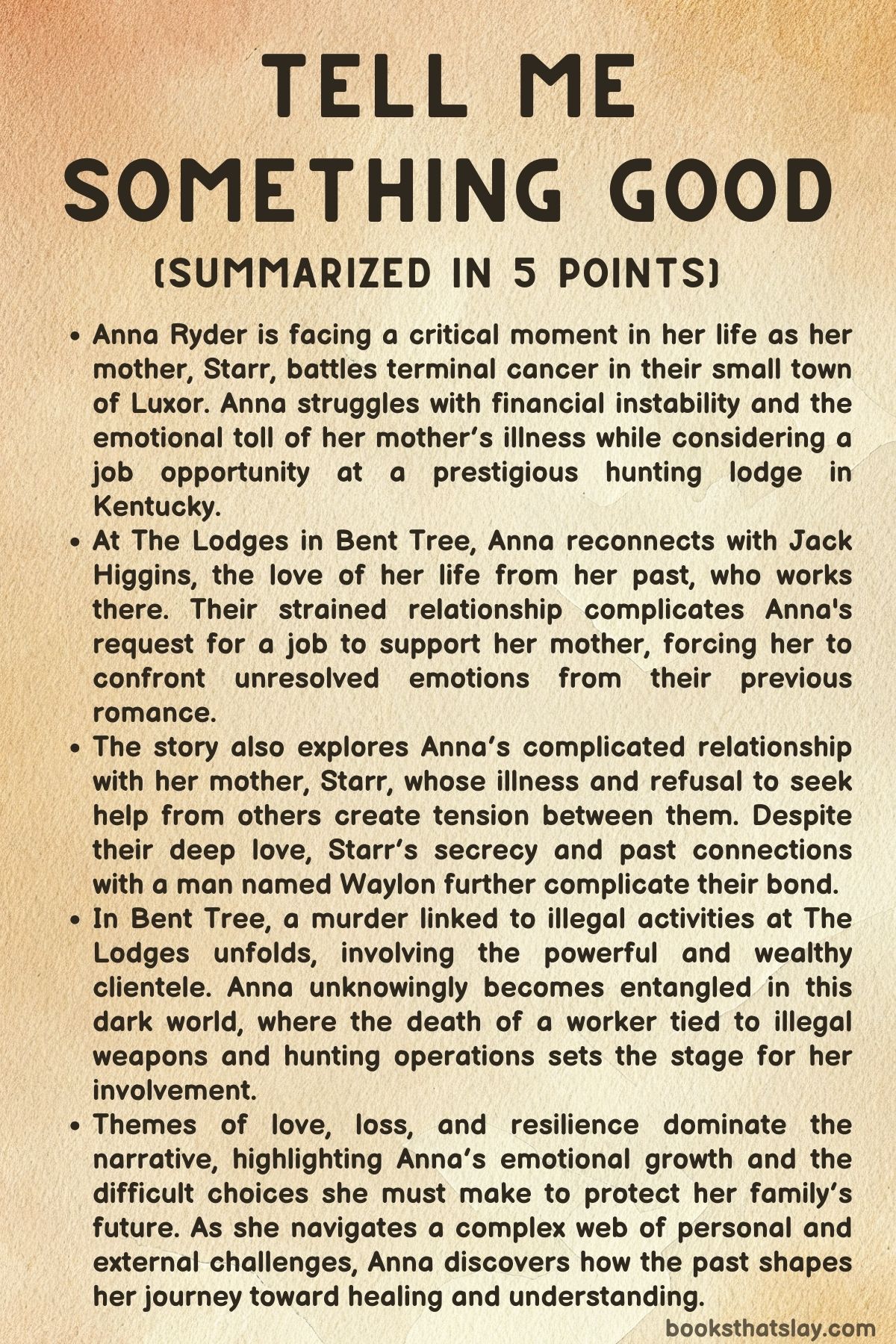Tell Me Something Good Summary, Characters and Themes
Tell Me Something Good by Court Stevens is a gripping novel that explores the depths of family ties, unresolved emotions, and the hidden secrets that can shape one’s life. Set against the backdrop of small-town Illinois, the story follows Anna Ryder, a woman caught in the midst of personal turmoil as her mother, Starr, battles terminal cancer.
As Anna faces the collapse of her professional and financial life, she is forced to confront not only the complexities of her strained relationship with her mother but also the ghosts of her past, especially her former lover, Jack Higgins. As the story unfolds, themes of love, loss, sacrifice, and emotional resilience take center stage, as Anna navigates a world full of deception, danger, and unexpected connections.
Summary
The story revolves around Anna Ryder, a young woman struggling with the challenges of life in Luxor, a small, impoverished town in Illinois. Her mother, Starr, has been diagnosed with terminal cancer, and their situation becomes increasingly dire.
Starr refuses to sell their family farm, a decision that leaves them both in financial jeopardy. Anna’s life further unravels when her job at the local high school is cut due to budget constraints, leaving her without a clear way to support her mother.
With little hope in Luxor, Anna begins to consider leaving the town and finding work elsewhere, specifically at The Lodges in Bent Tree, Kentucky, a renowned hunting facility.
Bent Tree is a small rural town that houses The Lodges, a place frequented by wealthy and influential individuals. To Anna’s surprise, she finds out that Jack Higgins, the love of her life who she has not seen in years, works at The Lodges.
Their relationship had ended abruptly in the past, leaving Anna heartbroken and with unresolved emotions. Despite the painful history between them, Anna swallows her pride and seeks out Jack, hoping that he might be able to help her secure a job and save her family from their financial struggles.
The novel delves into Anna’s strained relationship with her mother, Starr. Although they share a strong bond, their relationship is complicated by Starr’s refusal to acknowledge the severity of her illness and ask for help.
Starr’s unconventional ways of showing love, including humor and a fiercely independent attitude, sometimes clash with Anna’s need for support. In the midst of this tension, Anna’s past with Jack resurfaces, forcing her to confront old wounds and unresolved feelings.
As Anna arrives in Bent Tree, she learns that The Lodges is not only a prestigious hunting destination but also a place filled with dark secrets. One of these secrets involves a murder at The Lodges.
A worker, who overheard a conversation about illegal weapons, is killed to keep the criminal activities surrounding the facility under wraps. This adds another layer of tension to Anna’s already difficult situation, as she must navigate not only her complicated feelings for Jack but also the dangerous and corrupt environment she has stepped into.
Throughout the novel, Anna’s journey is marked by the struggle to balance her responsibilities to her mother and her own personal growth. As Starr’s health worsens, Anna is forced to reevaluate her relationship with her mother, realizing that the deep love they share sometimes becomes clouded by unspoken resentments and the burden of caring for someone so ill.
Starr’s history, especially her past relationship with Waylon Collins, a man from her past who still plays a part in their lives, adds another layer of complexity to their interactions.
As Anna works to secure a job at The Lodges, she finds herself thrust into a world of high-stakes business and dangerous dealings. She also reconnects with Murray Orlov, the manager of The Lodges, whose connections to the powerful guests and illegal activities surrounding the facility complicate Anna’s already difficult position.
Anna is soon faced with difficult choices, including whether to trust Jack, who has become a distant figure in her life, and whether she can survive in this new environment without compromising her own morals.
The novel explores themes of loyalty, sacrifice, and love, particularly through the lens of Anna’s relationships with her mother and Jack. The unresolved tension between Anna and Jack becomes a focal point of the story, as both characters are forced to confront the past and the reasons why their relationship ended so abruptly.
Despite the hurt and mistrust that remains, Anna finds herself needing Jack’s help, and she must put aside her pride to ask for assistance in securing a future for herself and her mother.
As the narrative unfolds, the mysteries surrounding The Lodges grow deeper, with Anna’s investigation into the death of a worker uncovering dark secrets about the facility and the people who operate it. The story highlights the complex nature of family dynamics, especially when secrets and past mistakes weigh heavily on the present.
Anna’s journey of self-discovery becomes intertwined with the larger mystery of The Lodges and its ties to criminal activities, which ultimately leads to a confrontation with the past that forces all the characters involved to make difficult choices.
At the core of Tell Me Something Good is a reflection on the sacrifices people make for the ones they love and the emotional baggage that often comes with those sacrifices. The novel shows the difficulty of reconciling the past with the present and the struggle to move forward while dealing with the ghosts of what came before.
As Anna navigates her complex relationships, she learns the importance of confronting difficult truths, not only about the people she loves but also about herself.
The dark legacy of The Lodges and its connections to powerful figures provide a backdrop for Anna’s emotional growth. As she becomes more entangled in the world of The Lodges and its secrets, Anna’s choices take on greater significance, revealing the true cost of survival and the depth of the emotional scars left by love, betrayal, and loss.
Through Anna’s story, Tell Me Something Good ultimately becomes a testament to the strength of the human spirit and the resilience needed to face life’s most difficult challenges.

Characters
Anna Ryder
Anna Ryder is the central figure in Tell Me Something Good. Her character is complex and multifaceted, embodying themes of love, loss, and survival.
Initially, Anna is a woman overwhelmed by the financial and emotional burdens of caring for her terminally ill mother, Starr. She grapples with a mixture of grief, guilt, and regret, particularly in relation to her past relationships, most notably with Jack Higgins.
As her mother’s health declines, Anna is forced to confront her feelings for Jack, a man with whom she shares a deeply emotional history. Their past relationship remains unresolved, filled with a mixture of love, resentment, and the scars of betrayal.
Throughout the story, Anna’s emotional growth is central, as she transitions from someone burdened by her past to someone who must make difficult choices to protect her family. Her interactions with the men in her life, particularly Jack and Murray, highlight the internal conflict she faces, torn between loyalty, love, and the need for survival.
Anna’s journey ultimately focuses on self-discovery, navigating her complicated relationships, and coming to terms with her family’s dark past.
Starr
Starr, Anna’s mother, plays a crucial role in shaping Anna’s journey. A woman full of life and humor, Starr is also deeply flawed, refusing to acknowledge the extent of her illness or seek help from others, even when she desperately needs it.
Her relationship with Anna is one of love and tension, complicated by Starr’s refusal to open up about her past, including her involvement in the tragic events surrounding the “Choir Girls.” Starr’s terminal illness serves as the emotional and narrative catalyst for the story, pushing Anna to confront not only the reality of losing her mother but also the secrets Starr has kept hidden.
Starr’s love for Anna is undeniable, but her unconventional parenting style, coupled with the emotional distance she maintains, makes their relationship fraught. The revelation of her past connections to the illegal activities in Bent Tree adds further complexity to her character, showing a woman who is both a protector and a deeply troubled figure in Anna’s life.
Jack Higgins
Jack Higgins, Anna’s former lover, is a deeply conflicted character. His connection to Anna is rooted in a past full of unspoken emotions, with the remnants of their love haunting every interaction they have.
Jack’s transformation from an idealistic activist to a quieter, more self-reflective man adds depth to his character. His initial reluctance to help Anna is a direct result of his unresolved feelings for her and the emotional baggage they share.
As the story progresses, Jack’s loyalty to Murray Orlov and his moral struggle with the darker activities at The Lodges reveal his inner turmoil. While he may appear withdrawn and distant, Jack’s actions show that he is still deeply connected to Anna, even if he struggles to reconcile his feelings of guilt and love.
His character serves as a tragic figure who faces the consequences of past actions, and his death in the story becomes a turning point that forces Anna to confront her grief and the implications of their shared past.
Murray Orlov
Murray Orlov is a character defined by ambition, control, and a deep involvement in the illicit operations surrounding The Lodges. As the manager of the Royale, Murray’s authority and manipulation of those around him, including Anna, show the darker side of his character.
He is a man driven by a desire for power and influence, using his position to manipulate Anna into doing his bidding, all while keeping the sinister activities of The Lodges under wraps. His relationship with Jack is strained, as Jack sees through Murray’s control and manipulation.
Murray’s character is shrouded in secrecy, with a personal and professional life intertwined with shady dealings and moral ambiguity. His role in the murder of Noah and his connections to the underground auction involving weapons and other illegal activities make him a central figure in the story’s unfolding mystery.
Murray’s manipulation of Anna, paired with his involvement in the morally corrupt world of The Lodges, highlights the extent to which he is willing to go to preserve his power and control.
Foster Portage
Foster Portage, a demanding and often abrasive guest at The Lodges, adds another layer of complexity to the narrative. Her relationship with Murray is one of tension and antagonism, as she regularly challenges his authority and critiques the operation of the lodge.
Foster’s sharp observations and indifference to the luxury around her make her a character that is both difficult to please and hard to ignore. Her behavior, such as the incident with the baby raccoon in the lobby, provides moments of tension, but also a sense of comic relief in an otherwise dark atmosphere.
Foster’s role in the narrative is also tied to the potential exposure of secrets at The Lodges, particularly through her podcast, which threatens to unravel the carefully constructed facade of the Lodge’s operations. Though initially perceived as a difficult and annoying character, Foster’s sharpness and relentless pursuit of truth make her a key figure in revealing the darker undertones of the Lodge and the complex web of relationships surrounding it.
Beck
Beck, Anna’s father figure, offers a unique perspective on love and regret, helping to shape Anna’s emotional journey. His relationship with Starr is one filled with unspoken resentment and past wounds, particularly regarding their failed relationship and the love that once existed between them.
Beck’s insights into his own past struggles with love provide Anna with valuable emotional guidance as she navigates her own complicated feelings for Jack and her mother. Though Beck’s presence in the narrative is more subdued compared to other characters, his reflections on the pain and beauty of love influence Anna’s decisions and emotional growth.
His role as a father figure to Anna also helps her understand the complexities of human relationships, particularly in the context of family, loyalty, and forgiveness.
Gleb Orlov
Gleb Orlov, a key player in the dark world of weapons smuggling and illicit auctions, is tied to the larger mysteries of the story. His involvement in the murder of the “Choir Girls” and his relationship with Starr create a murky, morally ambiguous character whose true intentions remain hidden until the latter stages of the narrative.
Gleb’s role in the story is central to uncovering the dark legacy of the Orlov family and their connections to the illegal operations in Bent Tree. His actions, driven by jealousy and control, ultimately contribute to the tragedy surrounding the “Choir Girls” and the web of lies that Anna must navigate.
Gleb’s character represents the dangers of unchecked power and the moral compromise that comes with ambition and desire for control.
Waylon Collins
Waylon Collins is a figure from Starr’s past whose involvement in the illegal activities surrounding the auction and the “Choir Girls” murder adds an element of suspense to the narrative. Waylon’s presence in the story hints at past betrayals and unresolved issues between him and Starr, particularly related to the death of the “Choir Girls.”
His character serves as a reminder of the complexities of love, betrayal, and loyalty in the world of Bent Tree, with his role in the story gradually unfolding as Anna uncovers more truths about her mother’s past. Waylon’s involvement in the cover-up surrounding the murders adds layers to the mystery and highlights the lengths to which people will go to protect themselves and their secrets.
Themes
Family and Sacrifice
In Tell Me Something Good, family plays a central role in shaping the characters’ decisions and emotional journeys. Anna Ryder’s bond with her mother, Starr, serves as the heart of the narrative.
The sacrifices both women make for each other are often veiled in complexity, as Starr’s refusal to sell their farm, despite the dire financial situation, demonstrates her unyielding love and dedication to preserving their family’s legacy. The tension between Anna’s need to provide for her mother’s care and Starr’s insistence on maintaining independence underscores the struggle between generational love and personal pride.
Throughout the story, the theme of family sacrifice is explored in various ways. Anna’s decision to confront her past and seek help from Jack Higgins, despite their painful history, is another testament to the lengths she is willing to go to for her family’s survival.
The story highlights how family loyalty can push individuals to compromise their own happiness, forcing them to make choices they would otherwise avoid. As Anna grapples with her complicated relationship with her mother, she is also faced with the revelation of her family’s darker secrets, challenging her perception of what it means to protect and care for those she loves.
Love and Loss
The theme of love and loss is woven throughout Tell Me Something Good, encapsulating the emotional core of the story. Anna’s relationship with Jack Higgins is fraught with unresolved feelings, regret, and unhealed wounds from their past.
Their love story, which ended abruptly years ago, lingers over their interactions in the present. Anna’s complex feelings toward Jack highlight how love can be both a source of immense joy and profound pain.
Their strained relationship serves as a reflection of the larger theme of love’s transformative power, as Anna navigates her emotions and confronts the past she has tried to forget. In addition to romantic love, the novel also explores familial love, particularly between Anna and her mother, Starr.
Starr’s terminal illness forces Anna to face the inevitable loss of the one person she’s always relied on, while simultaneously pushing her to question what she truly wants from her own future. The duality of love and loss, both in Anna’s romantic and familial relationships, illuminates the emotional depth of the story.
The characters’ struggles with love, regret, and the fear of loss are integral to their growth and decision-making, with each loss leading to a deeper understanding of the true cost of love.
Secrets and Deception
The theme of secrets and deception runs throughout Tell Me Something Good, creating an atmosphere of mystery and tension that drives the narrative. Anna’s journey is shaped by the gradual revelation of secrets, both personal and familial, that have been buried for years.
The murder of the “Choir Girls” and the involvement of her mother, Starr, in these dark events are central to the story’s unfolding mysteries. Anna’s discovery of these secrets forces her to confront uncomfortable truths about her family, particularly her mother’s past.
The secrecy surrounding Starr’s illness also plays a significant role in the story, as her reluctance to ask for help and her refusal to acknowledge the severity of her condition further complicate Anna’s emotional turmoil. The world of The Lodges, with its shady dealings and hidden agendas, adds another layer of deception, as Anna uncovers the illegal activities tied to the facility.
The story also explores the psychological toll of keeping secrets, as characters such as Murray Orlov and Waylon Collins grapple with their own hidden motives and the consequences of their actions. The theme of deception is a powerful driver in the narrative, with each secret revealed leading to new conflicts and revelations that push Anna and other characters to reassess their past choices.
Redemption and Forgiveness
Redemption and forgiveness emerge as central themes in Tell Me Something Good, particularly as characters struggle with the consequences of their actions and the emotional scars of their pasts. Anna’s emotional journey is one of self-discovery, as she navigates the pain of her past mistakes and seeks a path toward healing.
Her strained relationship with Jack, shaped by betrayal and miscommunication, reflects the complexities of forgiveness. As Anna confronts Jack and the unresolved issues between them, the theme of redemption becomes intertwined with the idea of emotional healing.
Jack’s character arc also revolves around seeking redemption for his own actions, as he grapples with the guilt of his past decisions and the impact they have had on those around him. The story emphasizes the power of forgiveness, both toward others and oneself, as the characters work through their personal struggles and attempt to rebuild broken relationships.
Starr’s own need for redemption, as her past comes to light, highlights how the pursuit of redemption can often be a long and painful journey. Ultimately, the novel portrays the idea that redemption and forgiveness are not easily achieved, but they offer the possibility of growth, change, and emotional peace for those willing to face their pasts.
Identity and Self-Discovery
The theme of identity and self-discovery plays a crucial role in the development of the characters in Tell Me Something Good. Anna’s emotional journey is marked by her quest to understand who she is beyond the roles of daughter and caretaker.
As she uncovers secrets about her family’s past, including the role her mother played in the murder of the “Choir Girls,” Anna is forced to reevaluate her own identity and the person she has become. The revelation of her mother’s involvement in dark activities shakes Anna’s sense of self, challenging her understanding of love, loyalty, and family.
Through her interactions with Jack, Anna also confronts her past choices, the decisions that led to their separation, and the emotions she still harbors for him. The process of self-discovery is not limited to Anna, as other characters, such as Jack and Murray, also struggle with their sense of identity.
Jack’s transformation from an idealistic activist to a more reserved and guilt-ridden individual highlights the ways in which personal experiences shape one’s identity. The theme of identity is further explored through the lens of the past, as characters confront the legacies of their actions and the impact those legacies have on their futures.
As Anna navigates these complex emotional landscapes, the story paints a vivid picture of the difficulties and rewards of understanding oneself in the face of overwhelming challenges.


